Nursing Career Plan: Achieving RN Status and Leadership Goals
VerifiedAdded on 2020/05/28
|7
|1500
|464
Report
AI Summary
This nursing career plan outlines the student's goal of becoming a Registered Nurse (RN) and eventually transitioning into a nursing leadership role. The plan begins with a self-assessment using a SWOT analysis to identify strengths, weaknesses, opportunities, and threats related to the transition. The student highlights strengths in communication and compassion, while recognizing weaknesses in critical thinking and multitasking. Opportunities include experience gained in a nursing home, while threats include the impact of weak critical thinking skills on evidence-based practice. The student's philosophy of nursing practice emphasizes patient-centered care, accountability, and therapeutic relationships, in line with NMBA standards. Strategies for professional development include continuous professional development to improve multitasking, learning critical thinking models, and training in evidence-based practice to overcome identified weaknesses and achieve long-term career goals. The student uses references from the field to support the arguments.
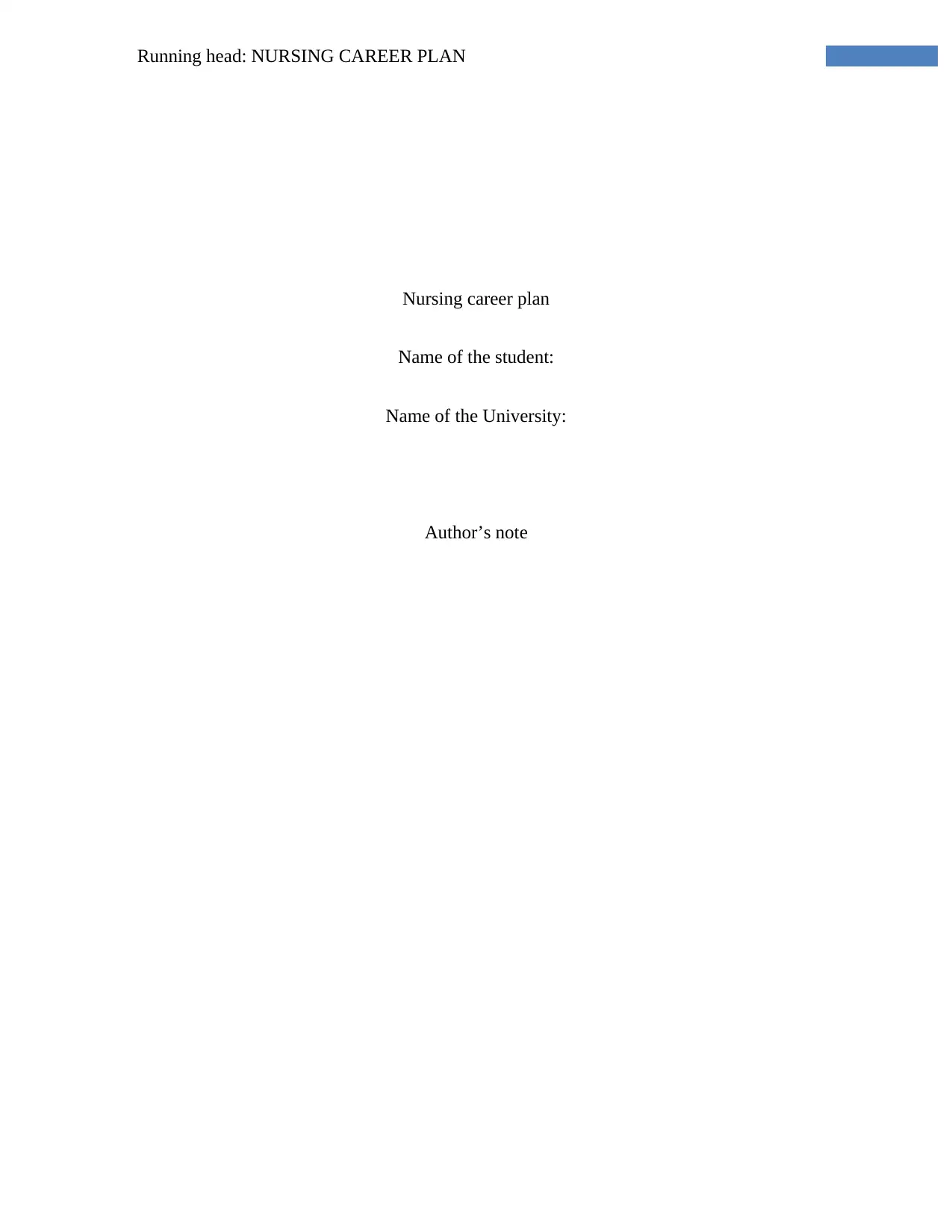
Running head: NURSING CAREER PLAN
Nursing career plan
Name of the student:
Name of the University:
Author’s note
Nursing career plan
Name of the student:
Name of the University:
Author’s note
Paraphrase This Document
Need a fresh take? Get an instant paraphrase of this document with our AI Paraphraser
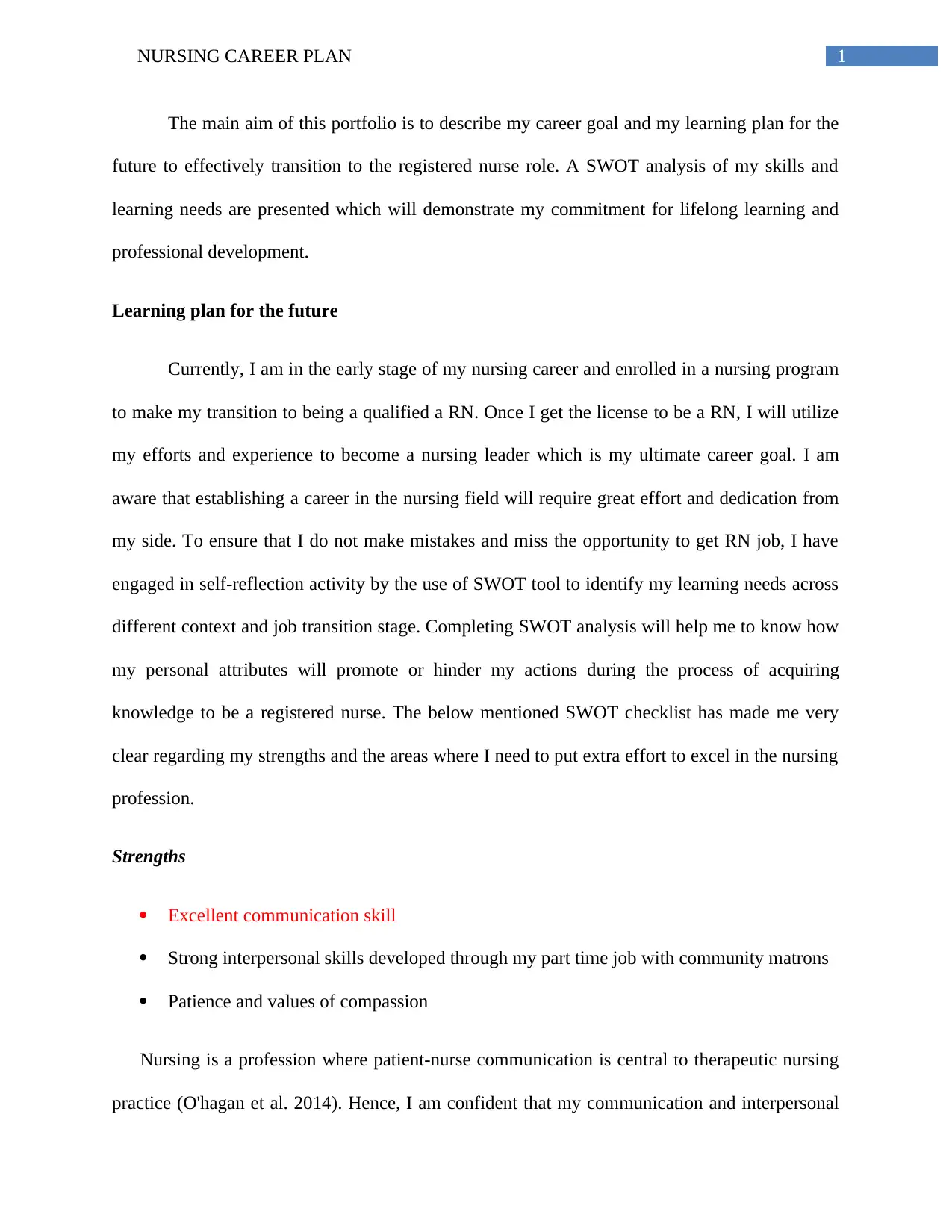
1NURSING CAREER PLAN
The main aim of this portfolio is to describe my career goal and my learning plan for the
future to effectively transition to the registered nurse role. A SWOT analysis of my skills and
learning needs are presented which will demonstrate my commitment for lifelong learning and
professional development.
Learning plan for the future
Currently, I am in the early stage of my nursing career and enrolled in a nursing program
to make my transition to being a qualified a RN. Once I get the license to be a RN, I will utilize
my efforts and experience to become a nursing leader which is my ultimate career goal. I am
aware that establishing a career in the nursing field will require great effort and dedication from
my side. To ensure that I do not make mistakes and miss the opportunity to get RN job, I have
engaged in self-reflection activity by the use of SWOT tool to identify my learning needs across
different context and job transition stage. Completing SWOT analysis will help me to know how
my personal attributes will promote or hinder my actions during the process of acquiring
knowledge to be a registered nurse. The below mentioned SWOT checklist has made me very
clear regarding my strengths and the areas where I need to put extra effort to excel in the nursing
profession.
Strengths
Excellent communication skill
Strong interpersonal skills developed through my part time job with community matrons
Patience and values of compassion
Nursing is a profession where patient-nurse communication is central to therapeutic nursing
practice (O'hagan et al. 2014). Hence, I am confident that my communication and interpersonal
The main aim of this portfolio is to describe my career goal and my learning plan for the
future to effectively transition to the registered nurse role. A SWOT analysis of my skills and
learning needs are presented which will demonstrate my commitment for lifelong learning and
professional development.
Learning plan for the future
Currently, I am in the early stage of my nursing career and enrolled in a nursing program
to make my transition to being a qualified a RN. Once I get the license to be a RN, I will utilize
my efforts and experience to become a nursing leader which is my ultimate career goal. I am
aware that establishing a career in the nursing field will require great effort and dedication from
my side. To ensure that I do not make mistakes and miss the opportunity to get RN job, I have
engaged in self-reflection activity by the use of SWOT tool to identify my learning needs across
different context and job transition stage. Completing SWOT analysis will help me to know how
my personal attributes will promote or hinder my actions during the process of acquiring
knowledge to be a registered nurse. The below mentioned SWOT checklist has made me very
clear regarding my strengths and the areas where I need to put extra effort to excel in the nursing
profession.
Strengths
Excellent communication skill
Strong interpersonal skills developed through my part time job with community matrons
Patience and values of compassion
Nursing is a profession where patient-nurse communication is central to therapeutic nursing
practice (O'hagan et al. 2014). Hence, I am confident that my communication and interpersonal
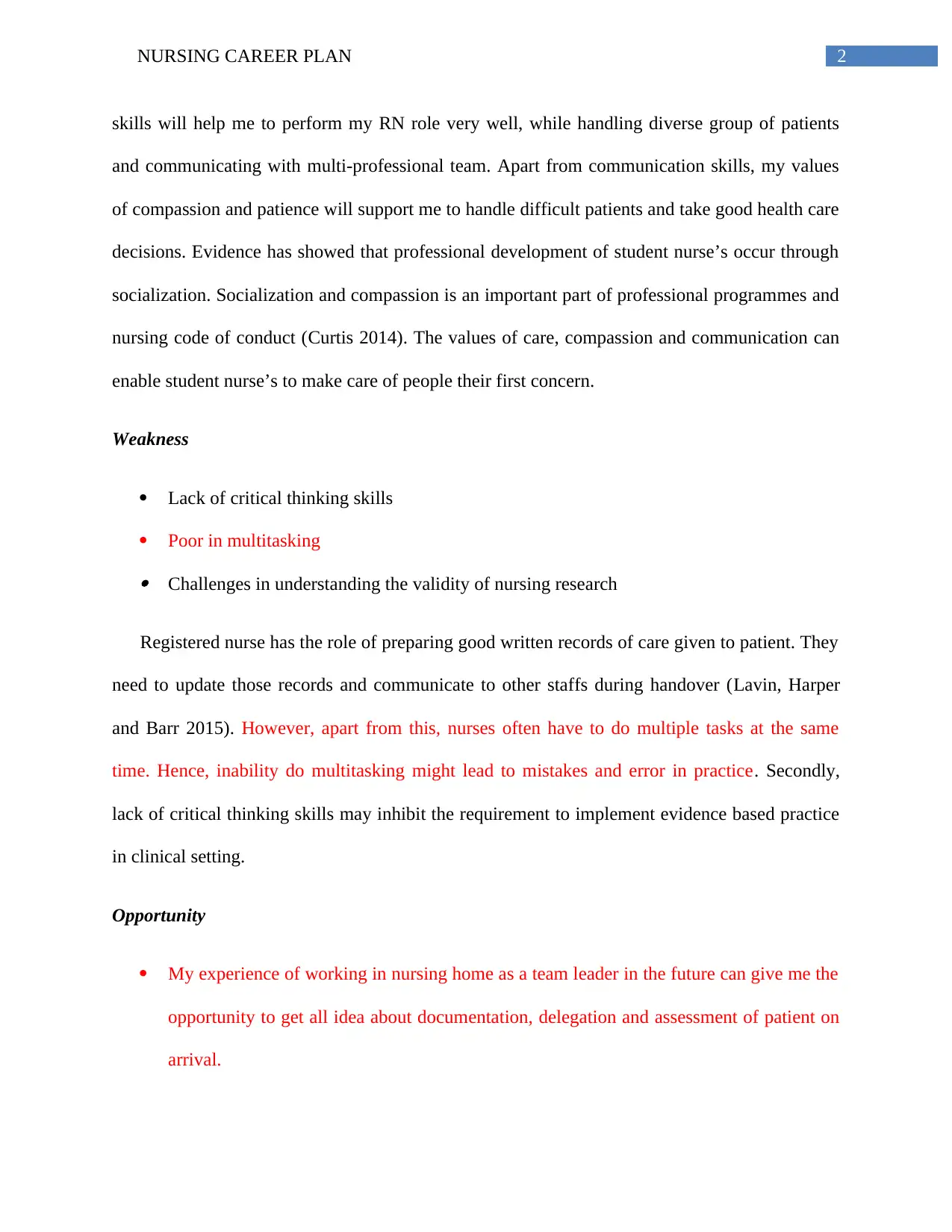
2NURSING CAREER PLAN
skills will help me to perform my RN role very well, while handling diverse group of patients
and communicating with multi-professional team. Apart from communication skills, my values
of compassion and patience will support me to handle difficult patients and take good health care
decisions. Evidence has showed that professional development of student nurse’s occur through
socialization. Socialization and compassion is an important part of professional programmes and
nursing code of conduct (Curtis 2014). The values of care, compassion and communication can
enable student nurse’s to make care of people their first concern.
Weakness
Lack of critical thinking skills
Poor in multitasking Challenges in understanding the validity of nursing research
Registered nurse has the role of preparing good written records of care given to patient. They
need to update those records and communicate to other staffs during handover (Lavin, Harper
and Barr 2015). However, apart from this, nurses often have to do multiple tasks at the same
time. Hence, inability do multitasking might lead to mistakes and error in practice. Secondly,
lack of critical thinking skills may inhibit the requirement to implement evidence based practice
in clinical setting.
Opportunity
My experience of working in nursing home as a team leader in the future can give me the
opportunity to get all idea about documentation, delegation and assessment of patient on
arrival.
skills will help me to perform my RN role very well, while handling diverse group of patients
and communicating with multi-professional team. Apart from communication skills, my values
of compassion and patience will support me to handle difficult patients and take good health care
decisions. Evidence has showed that professional development of student nurse’s occur through
socialization. Socialization and compassion is an important part of professional programmes and
nursing code of conduct (Curtis 2014). The values of care, compassion and communication can
enable student nurse’s to make care of people their first concern.
Weakness
Lack of critical thinking skills
Poor in multitasking Challenges in understanding the validity of nursing research
Registered nurse has the role of preparing good written records of care given to patient. They
need to update those records and communicate to other staffs during handover (Lavin, Harper
and Barr 2015). However, apart from this, nurses often have to do multiple tasks at the same
time. Hence, inability do multitasking might lead to mistakes and error in practice. Secondly,
lack of critical thinking skills may inhibit the requirement to implement evidence based practice
in clinical setting.
Opportunity
My experience of working in nursing home as a team leader in the future can give me the
opportunity to get all idea about documentation, delegation and assessment of patient on
arrival.
⊘ This is a preview!⊘
Do you want full access?
Subscribe today to unlock all pages.

Trusted by 1+ million students worldwide
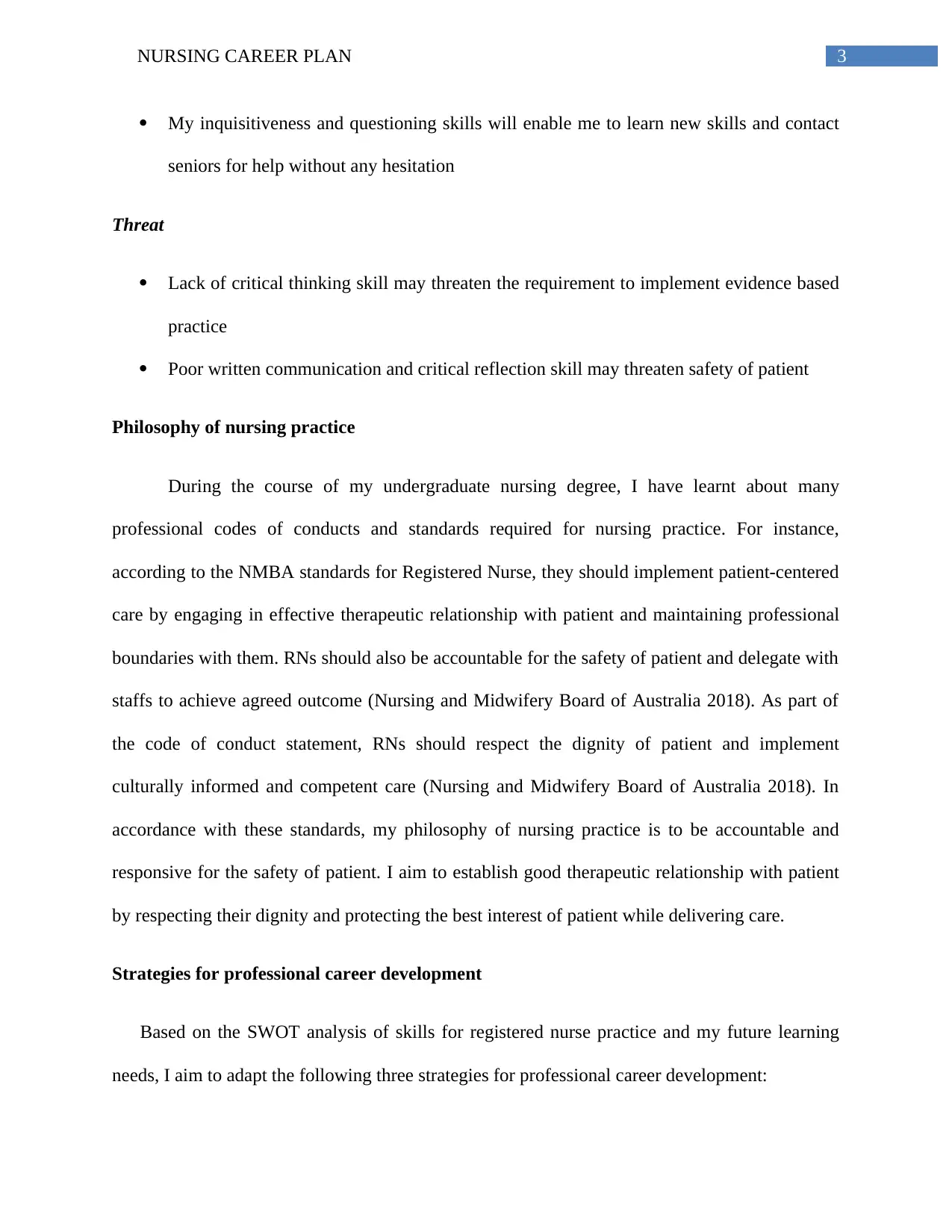
3NURSING CAREER PLAN
My inquisitiveness and questioning skills will enable me to learn new skills and contact
seniors for help without any hesitation
Threat
Lack of critical thinking skill may threaten the requirement to implement evidence based
practice
Poor written communication and critical reflection skill may threaten safety of patient
Philosophy of nursing practice
During the course of my undergraduate nursing degree, I have learnt about many
professional codes of conducts and standards required for nursing practice. For instance,
according to the NMBA standards for Registered Nurse, they should implement patient-centered
care by engaging in effective therapeutic relationship with patient and maintaining professional
boundaries with them. RNs should also be accountable for the safety of patient and delegate with
staffs to achieve agreed outcome (Nursing and Midwifery Board of Australia 2018). As part of
the code of conduct statement, RNs should respect the dignity of patient and implement
culturally informed and competent care (Nursing and Midwifery Board of Australia 2018). In
accordance with these standards, my philosophy of nursing practice is to be accountable and
responsive for the safety of patient. I aim to establish good therapeutic relationship with patient
by respecting their dignity and protecting the best interest of patient while delivering care.
Strategies for professional career development
Based on the SWOT analysis of skills for registered nurse practice and my future learning
needs, I aim to adapt the following three strategies for professional career development:
My inquisitiveness and questioning skills will enable me to learn new skills and contact
seniors for help without any hesitation
Threat
Lack of critical thinking skill may threaten the requirement to implement evidence based
practice
Poor written communication and critical reflection skill may threaten safety of patient
Philosophy of nursing practice
During the course of my undergraduate nursing degree, I have learnt about many
professional codes of conducts and standards required for nursing practice. For instance,
according to the NMBA standards for Registered Nurse, they should implement patient-centered
care by engaging in effective therapeutic relationship with patient and maintaining professional
boundaries with them. RNs should also be accountable for the safety of patient and delegate with
staffs to achieve agreed outcome (Nursing and Midwifery Board of Australia 2018). As part of
the code of conduct statement, RNs should respect the dignity of patient and implement
culturally informed and competent care (Nursing and Midwifery Board of Australia 2018). In
accordance with these standards, my philosophy of nursing practice is to be accountable and
responsive for the safety of patient. I aim to establish good therapeutic relationship with patient
by respecting their dignity and protecting the best interest of patient while delivering care.
Strategies for professional career development
Based on the SWOT analysis of skills for registered nurse practice and my future learning
needs, I aim to adapt the following three strategies for professional career development:
Paraphrase This Document
Need a fresh take? Get an instant paraphrase of this document with our AI Paraphraser
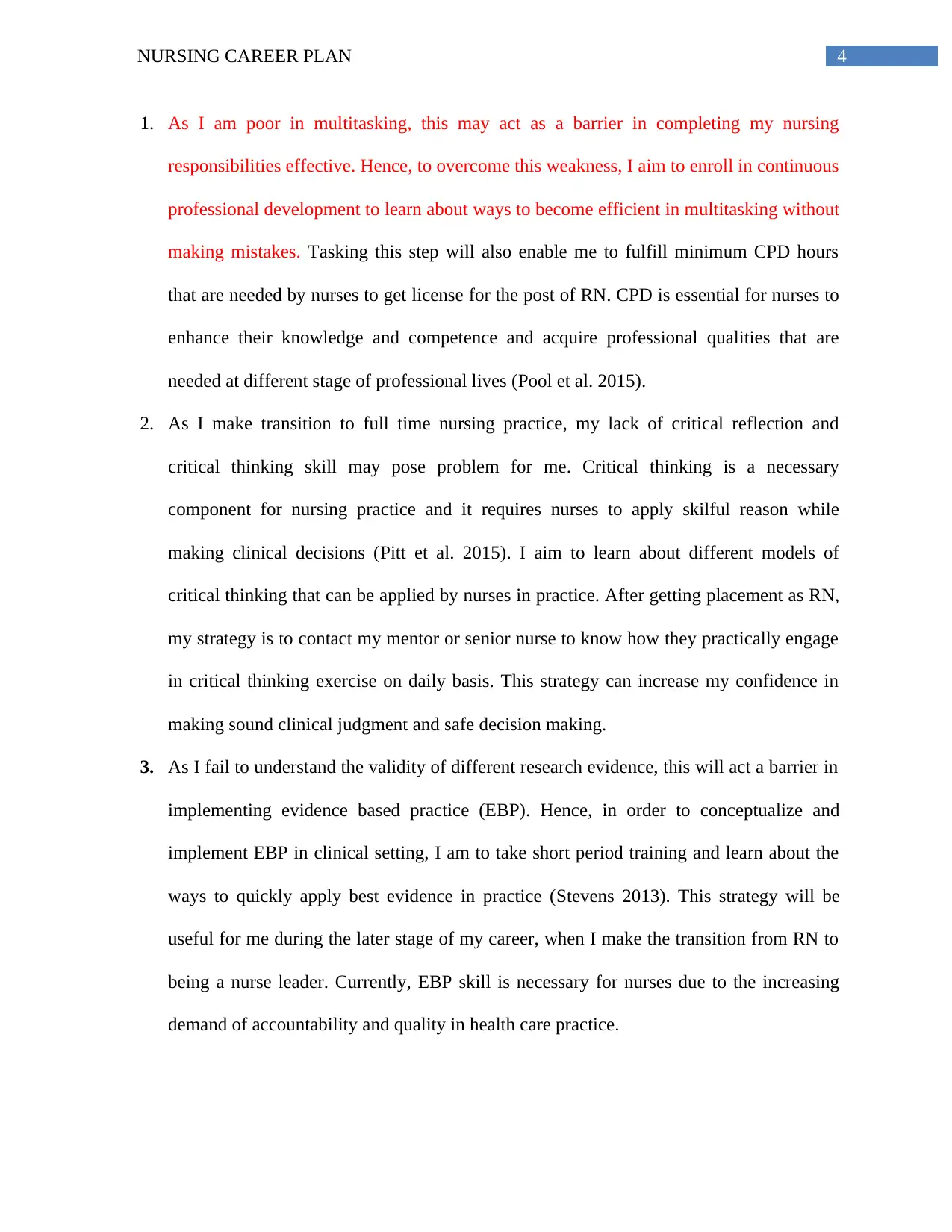
4NURSING CAREER PLAN
1. As I am poor in multitasking, this may act as a barrier in completing my nursing
responsibilities effective. Hence, to overcome this weakness, I aim to enroll in continuous
professional development to learn about ways to become efficient in multitasking without
making mistakes. Tasking this step will also enable me to fulfill minimum CPD hours
that are needed by nurses to get license for the post of RN. CPD is essential for nurses to
enhance their knowledge and competence and acquire professional qualities that are
needed at different stage of professional lives (Pool et al. 2015).
2. As I make transition to full time nursing practice, my lack of critical reflection and
critical thinking skill may pose problem for me. Critical thinking is a necessary
component for nursing practice and it requires nurses to apply skilful reason while
making clinical decisions (Pitt et al. 2015). I aim to learn about different models of
critical thinking that can be applied by nurses in practice. After getting placement as RN,
my strategy is to contact my mentor or senior nurse to know how they practically engage
in critical thinking exercise on daily basis. This strategy can increase my confidence in
making sound clinical judgment and safe decision making.
3. As I fail to understand the validity of different research evidence, this will act a barrier in
implementing evidence based practice (EBP). Hence, in order to conceptualize and
implement EBP in clinical setting, I am to take short period training and learn about the
ways to quickly apply best evidence in practice (Stevens 2013). This strategy will be
useful for me during the later stage of my career, when I make the transition from RN to
being a nurse leader. Currently, EBP skill is necessary for nurses due to the increasing
demand of accountability and quality in health care practice.
1. As I am poor in multitasking, this may act as a barrier in completing my nursing
responsibilities effective. Hence, to overcome this weakness, I aim to enroll in continuous
professional development to learn about ways to become efficient in multitasking without
making mistakes. Tasking this step will also enable me to fulfill minimum CPD hours
that are needed by nurses to get license for the post of RN. CPD is essential for nurses to
enhance their knowledge and competence and acquire professional qualities that are
needed at different stage of professional lives (Pool et al. 2015).
2. As I make transition to full time nursing practice, my lack of critical reflection and
critical thinking skill may pose problem for me. Critical thinking is a necessary
component for nursing practice and it requires nurses to apply skilful reason while
making clinical decisions (Pitt et al. 2015). I aim to learn about different models of
critical thinking that can be applied by nurses in practice. After getting placement as RN,
my strategy is to contact my mentor or senior nurse to know how they practically engage
in critical thinking exercise on daily basis. This strategy can increase my confidence in
making sound clinical judgment and safe decision making.
3. As I fail to understand the validity of different research evidence, this will act a barrier in
implementing evidence based practice (EBP). Hence, in order to conceptualize and
implement EBP in clinical setting, I am to take short period training and learn about the
ways to quickly apply best evidence in practice (Stevens 2013). This strategy will be
useful for me during the later stage of my career, when I make the transition from RN to
being a nurse leader. Currently, EBP skill is necessary for nurses due to the increasing
demand of accountability and quality in health care practice.
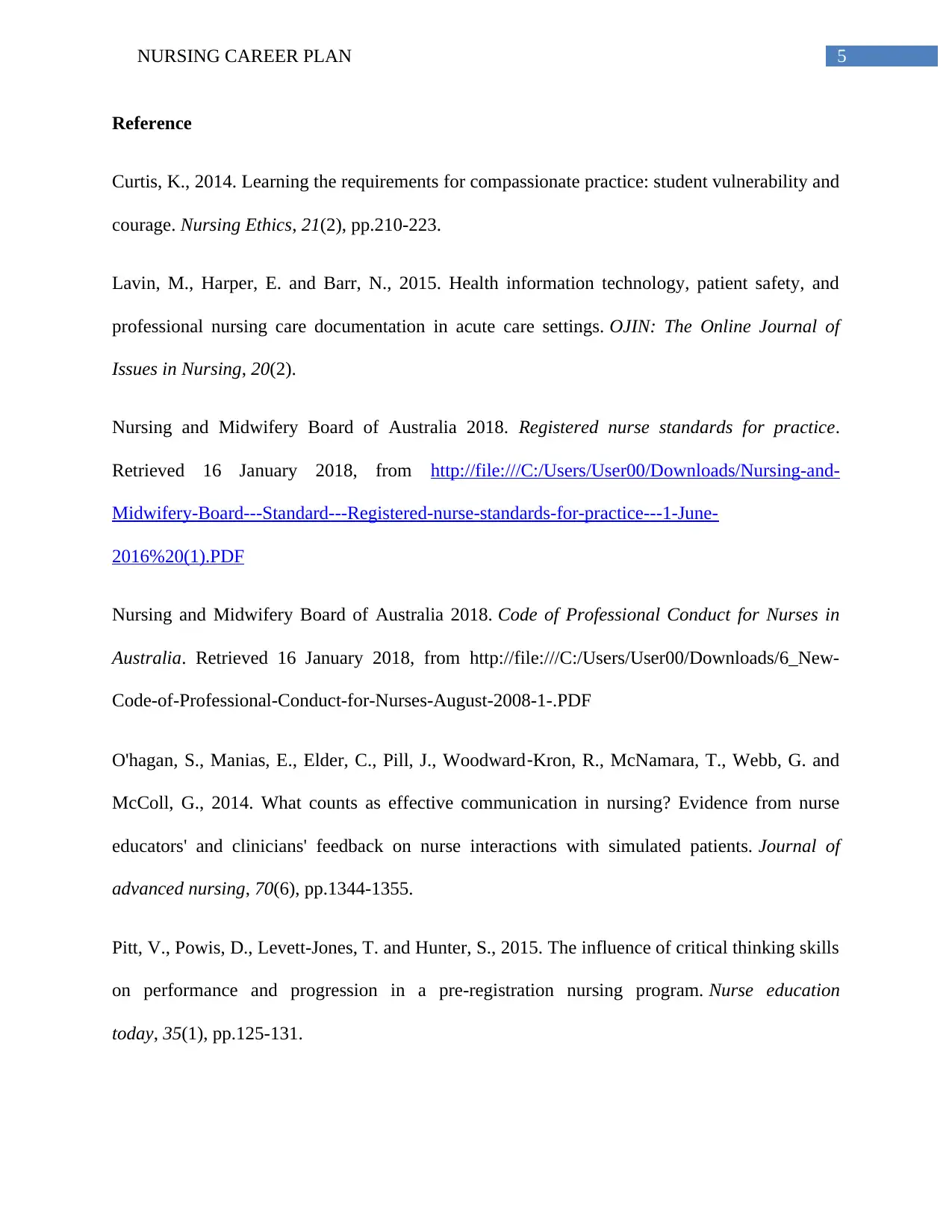
5NURSING CAREER PLAN
Reference
Curtis, K., 2014. Learning the requirements for compassionate practice: student vulnerability and
courage. Nursing Ethics, 21(2), pp.210-223.
Lavin, M., Harper, E. and Barr, N., 2015. Health information technology, patient safety, and
professional nursing care documentation in acute care settings. OJIN: The Online Journal of
Issues in Nursing, 20(2).
Nursing and Midwifery Board of Australia 2018. Registered nurse standards for practice.
Retrieved 16 January 2018, from http://file:///C:/Users/User00/Downloads/Nursing-and-
Midwifery-Board---Standard---Registered-nurse-standards-for-practice---1-June-
2016%20(1).PDF
Nursing and Midwifery Board of Australia 2018. Code of Professional Conduct for Nurses in
Australia. Retrieved 16 January 2018, from http://file:///C:/Users/User00/Downloads/6_New-
Code-of-Professional-Conduct-for-Nurses-August-2008-1-.PDF
O'hagan, S., Manias, E., Elder, C., Pill, J., Woodward‐Kron, R., McNamara, T., Webb, G. and
McColl, G., 2014. What counts as effective communication in nursing? Evidence from nurse
educators' and clinicians' feedback on nurse interactions with simulated patients. Journal of
advanced nursing, 70(6), pp.1344-1355.
Pitt, V., Powis, D., Levett-Jones, T. and Hunter, S., 2015. The influence of critical thinking skills
on performance and progression in a pre-registration nursing program. Nurse education
today, 35(1), pp.125-131.
Reference
Curtis, K., 2014. Learning the requirements for compassionate practice: student vulnerability and
courage. Nursing Ethics, 21(2), pp.210-223.
Lavin, M., Harper, E. and Barr, N., 2015. Health information technology, patient safety, and
professional nursing care documentation in acute care settings. OJIN: The Online Journal of
Issues in Nursing, 20(2).
Nursing and Midwifery Board of Australia 2018. Registered nurse standards for practice.
Retrieved 16 January 2018, from http://file:///C:/Users/User00/Downloads/Nursing-and-
Midwifery-Board---Standard---Registered-nurse-standards-for-practice---1-June-
2016%20(1).PDF
Nursing and Midwifery Board of Australia 2018. Code of Professional Conduct for Nurses in
Australia. Retrieved 16 January 2018, from http://file:///C:/Users/User00/Downloads/6_New-
Code-of-Professional-Conduct-for-Nurses-August-2008-1-.PDF
O'hagan, S., Manias, E., Elder, C., Pill, J., Woodward‐Kron, R., McNamara, T., Webb, G. and
McColl, G., 2014. What counts as effective communication in nursing? Evidence from nurse
educators' and clinicians' feedback on nurse interactions with simulated patients. Journal of
advanced nursing, 70(6), pp.1344-1355.
Pitt, V., Powis, D., Levett-Jones, T. and Hunter, S., 2015. The influence of critical thinking skills
on performance and progression in a pre-registration nursing program. Nurse education
today, 35(1), pp.125-131.
⊘ This is a preview!⊘
Do you want full access?
Subscribe today to unlock all pages.

Trusted by 1+ million students worldwide
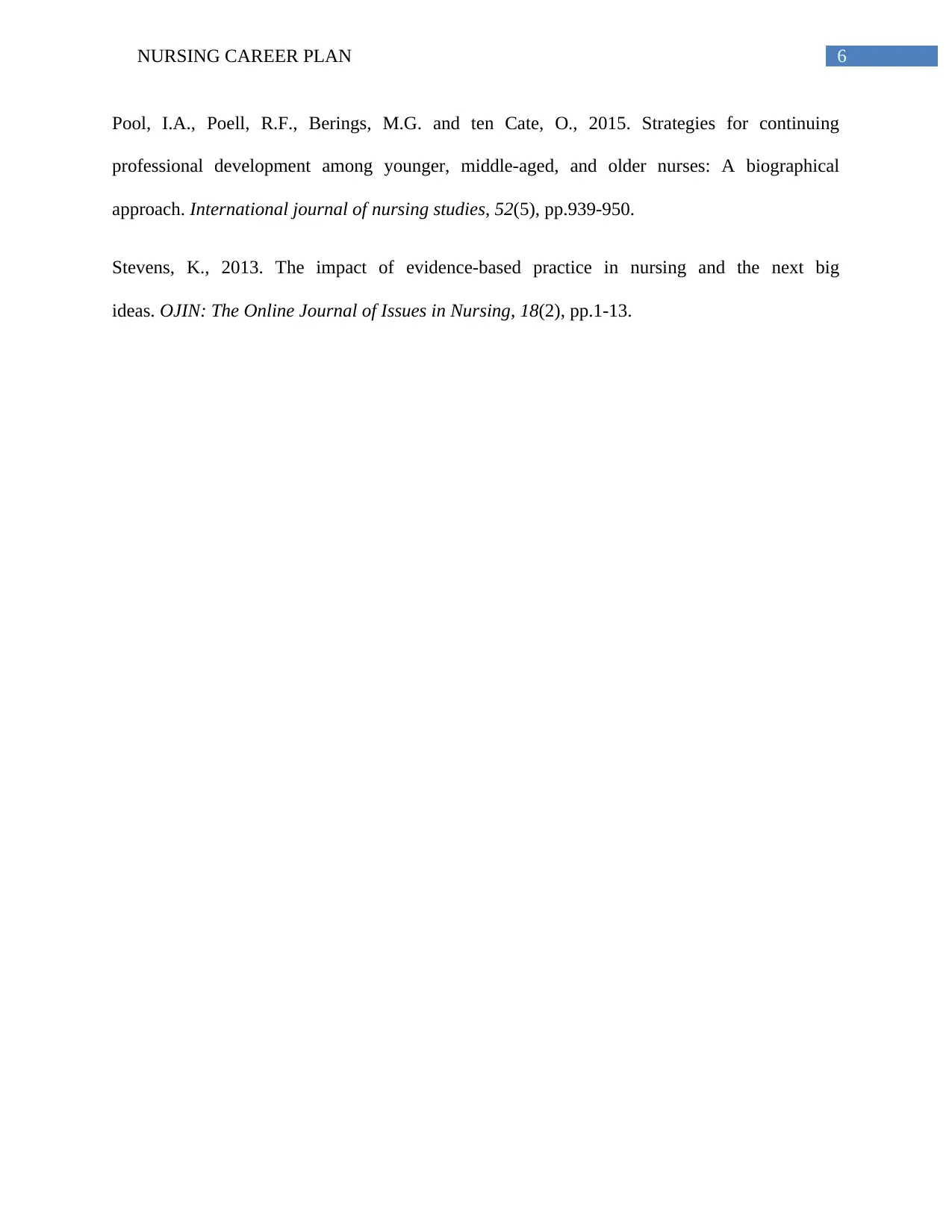
6NURSING CAREER PLAN
Pool, I.A., Poell, R.F., Berings, M.G. and ten Cate, O., 2015. Strategies for continuing
professional development among younger, middle-aged, and older nurses: A biographical
approach. International journal of nursing studies, 52(5), pp.939-950.
Stevens, K., 2013. The impact of evidence-based practice in nursing and the next big
ideas. OJIN: The Online Journal of Issues in Nursing, 18(2), pp.1-13.
Pool, I.A., Poell, R.F., Berings, M.G. and ten Cate, O., 2015. Strategies for continuing
professional development among younger, middle-aged, and older nurses: A biographical
approach. International journal of nursing studies, 52(5), pp.939-950.
Stevens, K., 2013. The impact of evidence-based practice in nursing and the next big
ideas. OJIN: The Online Journal of Issues in Nursing, 18(2), pp.1-13.
1 out of 7
Related Documents
Your All-in-One AI-Powered Toolkit for Academic Success.
+13062052269
info@desklib.com
Available 24*7 on WhatsApp / Email
![[object Object]](/_next/static/media/star-bottom.7253800d.svg)
Unlock your academic potential
Copyright © 2020–2026 A2Z Services. All Rights Reserved. Developed and managed by ZUCOL.





